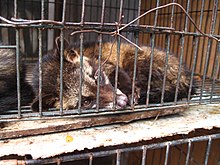
Wildlife farming refers to the raising of traditionally undomesticated animals in an agricultural setting to produce: living animals for canned hunting and to be kept as pets; commodities such as food and traditional medicine; and materials like leather, fur and fiber.
Purported benefits
Some conservationists argue, wildlife farming can protect endangered species from extinction by reducing the pressure on populations of wild animals which are often poached for food. Others claim that it may be harmful for the majority of conservation efforts, except for a select few species.
Certain African communities rely on bushmeat to obtain their daily amount of animal protein necessary to be healthy and survive. Oftentimes, bushmeat is not handled with care causing the spread of diseases. Wildlife farming can reduce the spread of diseases by providing African communities with bushmeat that is properly processed.
In his documentary film The End of Eden, South African filmmaker Rick Lomba, presented examples of the environmentally sustainable and indeed rejuvenating effect of certain types of wildlife farming.
Associated risks
Wildlife farming has been linked to the emergence of zoonotic diseases, such as the SARs outbreak which has since been connected with the farming of civets.
Current state of the industry
In recent years, South Africa has seen a massive growth in wildlife ranching (also known as game farming), which has led to a range of issues due to a lack of regulations. This has led to the reclassification of 33 wild species as farm animals.
As a result of the COVID-19 pandemic, approximately 20,000 wildlife farms have been shut-down in China. In the preceding years, the Chinese government had been promoting and incentivizing the development of the wildlife farming industry, which was valued as 520bn yuan, or £57bn, in 2017.
See also
References
- Damania, Richard; Bulte, Erwin H. (2007). "The economics of wildlife farming and endangered species conservation". Ecological Economics. 62 (3–4): 461–472. Bibcode:2007EcoEc..62..461D. doi:10.1016/j.ecolecon.2006.07.007.
- P, Chardonnet; B, des Clers; J, Fischer; R, Gerhold; F, Jori; F, Lamarque (Apr 2002). "The Value of Wildlife". Revue Scientifique et Technique (International Office of Epizootics). 21 (1): 15–51. PMID 11974626. Retrieved 2020-06-04.
- ^ Tensen, Laura (2016-04-01). "Under what circumstances can wildlife farming benefit species conservation?" (PDF). Global Ecology and Conservation. 6: 286–298. Bibcode:2016GEcoC...6..286T. doi:10.1016/j.gecco.2016.03.007. ISSN 2351-9894.
- ^ Conniff, Richard (2016-08-30). "Wildlife Farming: Does It Help Or Hurt Threatened Species?". Yale E360. Retrieved 2020-06-04.
- Ntiamoa-Baidu, Yaa (1997). "Chapter 2 - Direct contribution of wildlife to food security". www.fao.org. Retrieved 2019-03-06.
- Lomba, Rick (1986). The End of Eden (film).
{{cite AV media}}: CS1 maint: date and year (link) - Barth, Brian (2020-03-29). "Can Asia's infectious disease-producing wildlife trade be stopped?". Grist. Retrieved 2020-06-04.
- Kamuti, Tariro (2019-11-14). "South Africa struggles to manage wildlife ranching: why it's a problem". The Conversation. Retrieved 2020-06-04.
- Pinnock, Don (2019-10-15). "SA reclassifies 33 wild species as farm animals". Daily Maverick. Retrieved 2020-06-04.
- Standaert, Michael (2020-02-25). "Coronavirus closures reveal vast scale of China's secretive wildlife farm industry". The Guardian. ISSN 0261-3077. Retrieved 2020-06-04.
| Animal welfare | |||||
|---|---|---|---|---|---|
| Issues |
| ||||
| Concepts |
| ||||
| Pain in nonhuman animals | |||||
| Organisations |
| ||||
| Publications | |||||
| Activists and workers |
| ||||
| Scholars and writers |
| ||||
| Categories |
| ||||
| Religious considerations | |||||
| Rituals and festivals |
| ||||
| Legislation |
| ||||
| Related | |||||
| Hunting topics | |
|---|---|
| History | |
| Forms |
|
| Equipment | |
| Game | |
| Infrastructure | |
| By location |
|
| Regulation and conservation | |
| Culture |
|
| Organizations |
|
| Other | |